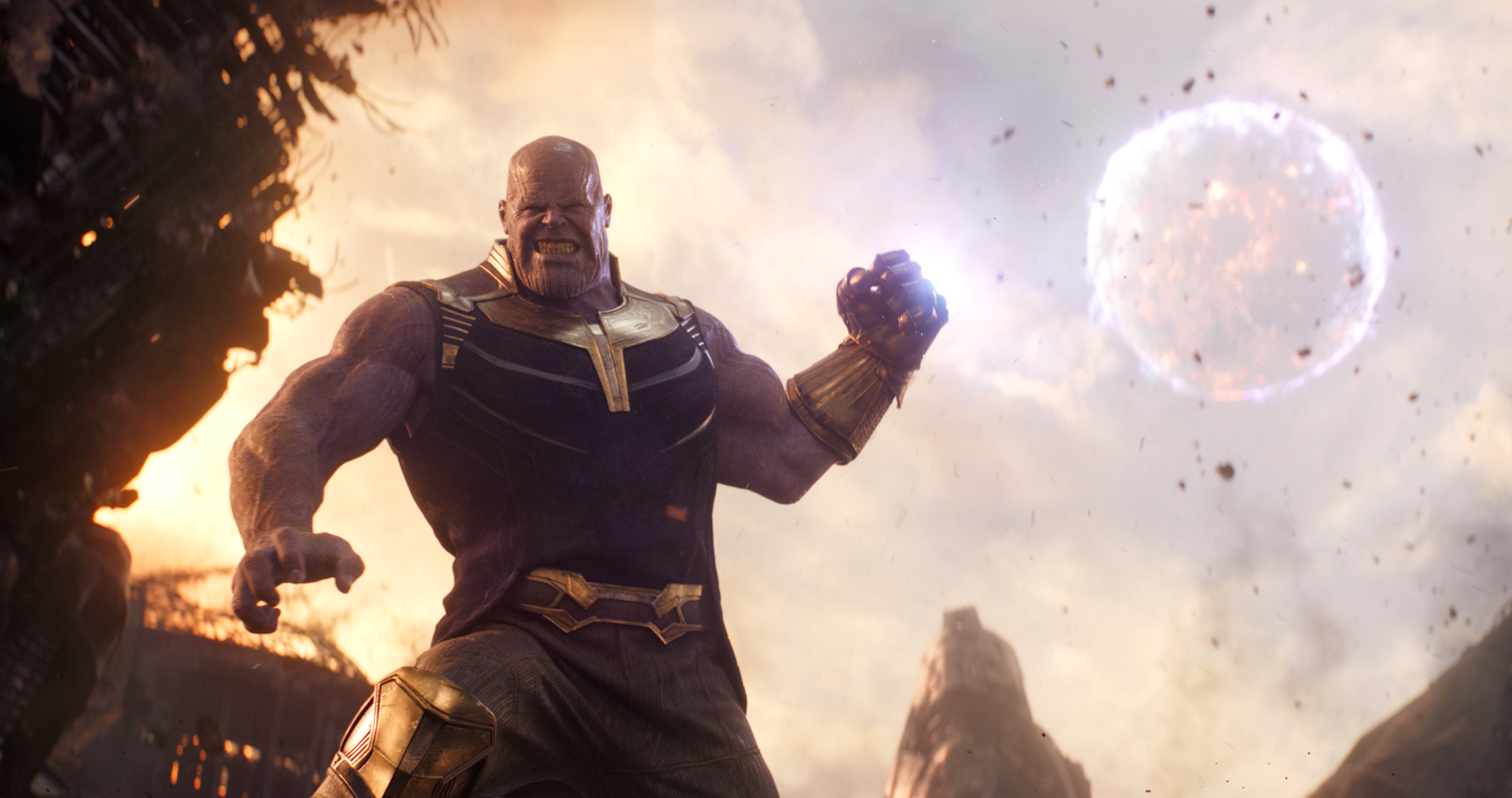Thanos is America
On the troubling American paternalism of Avengers: Infinity War


The eeriest thing about Avengers: Infinity War was how surprising it found its own ending. Granted, there are good reasons for this: This is a movie where the villain doesn't just win (breaking with Marvel convention); the extra twist is that he wins through enormous personal sacrifice and deeply-held principles. "The hardest choices require the strongest wills," Thanos intones. He isn't just Malthusian; he's paternalistic, pragmatic, and even (by a very particular definition) benevolent. It's a shame the superhero libs don't have the balls to do what needs to be done to save the universe from overpopulation. But it's fine. He'll carry on. As the only man keeping his head while all those around him lose theirs, he'll do what needs doing.
And he does. Having finally collected all six "infinity stones" for his "gauntlet" (picture a charm bracelet that's become a metal glove), he snaps his fingers and makes his vision for an ecologically sustainable universe come true. Half the people in the universe begin to silently disintegrate. Half the superheroes, too.
It's horrifying. I didn't expect to watch Black Panther die at the Grand Lake Theater in Oakland (a.k.a. Black Panther HQ) and it was rough. People screamed. A lot. Wakanda, the never-colonized wonderland that thrived without trauma and with technology, lasted one movie before it was decimated. T'Challa was wrong to open up to the world.
The Week
Escape your echo chamber. Get the facts behind the news, plus analysis from multiple perspectives.

Sign up for The Week's Free Newsletters
From our morning news briefing to a weekly Good News Newsletter, get the best of The Week delivered directly to your inbox.
From our morning news briefing to a weekly Good News Newsletter, get the best of The Week delivered directly to your inbox.
Part of me, though, was grateful for the horror. Movies like these make death and violence so routine that a different experience of death and destruction feels like an honest corrective. You should feel devastated by mass murder. And the effect was well-chosen. The spectacle of people becoming ash is bone-chilling because it's so quiet, so gentle, so utterly disconnected from the loud, talky, never-ending fighting around which the franchise has been built. And it builds on incomprehensible horrors of which we've been guilty ourselves: specifically, the atom bomb.
But this clear precedent — the fact that America has literally turned people to ash — is why the attitude the movie takes toward the end troubles me.
America has been Thanos, and it got over the slaughter without much difficulty. America has claimed that killing thousands of people irrespective of their age, occupation, status, or personal storyline was for the greater good. And here is the really eerie part: It's convinced many people that this is a correct assessment. It was a tough choice, sure, and it took a tough man — a great man, even — to make it. (You might say the hardest choices require the strongest wills.) Metaphorically speaking, America has sat in a garden and smiled because the world we bombed into being is (in our view) a better place. People said it was brutal, but America knew better. And got everyone to basically agree, or at least move on.
This is why I find the movie's belief that it's doing something experimental and unprecedented more than uncomfortable: Infinity War gambles dangerously with the way people process real deaths, never mind fictional ones. In fact, it's downright idealistic about the sustainability of human grief. Infinity War wants us to be devastated by Thanos' victory and the deaths of billions (a dozen of whom we actually care about). It needs us to carry that grief with us into the next movie next year. But it's playing with fire: Not because it's doing the unthinkable, but because people are actually awfully resilient. Thanos engages an ugly moral calculus that Infinity War finds quite shocking, but which we actually have a lot of experience normalizing. America decided the indiscriminate murder of tens of thousands of people was, on balance, okay. I suspect it might find the deaths of a few pretend superheroes a lot more tolerable than this movie thinks.
A free daily email with the biggest news stories of the day – and the best features from TheWeek.com
My gratitude that Infinity War seemed to be depicting death with the seriousness it warrants was, in other words, short-lived. The insubstantial tragedy of the film is compounded by the fact that we know many of these superheroes aren't "really" dead because more than one disintegrated character has an upcoming movie. That might not matter during the initial shock, but it sure waters down the impact of those deaths when you have time to think about them. It's confusing. It means the movie is lying to you — and you know it's a lie not because of anything in the story, but because of marketing.
Having hobbled the effectiveness of Thanos' genocide by forcing us to compare the deaths we watched onscreen to a market that dictates that those deaths literally can't have happened, Infinity War further dilutes its impact by saddling its "irredeemable" villain with a psychology and back story that we actually have a lot of historical practice redeeming.
You've likely noticed that — according to most history textbooks — wiping out tens of thousands of people with atomic bombs did not, somehow, make America the bad guy. Quite the contrary: Dropping the bomb got spun as a form of tough love that saved more lives than it lost. America went on to become the world's scary, benevolent, sometimes abusive dad. An empire, in fact, with all the paternalism that implies. This new fatherly role America was playing in the world filtered down to our social lives and reshaped the governing myths of the American family. The atom bomb ushered in an era — the '50s — when the American nuclear family structure hardened around exactly this model of benevolent, autocratic fatherhood. You may think killing hordes of innocent people is wrong, but Father Knows Best.
It's interesting, therefore, that Thanos — who genuinely wishes to save the universe, and thinks doing so requires killing half of it — has a backstory that is 100 percent about his fatherhood. He's the metastatic extreme of a certain model of the American father that mistakes abuse for tough love. His initiation into parenting was destructive rather than generative: He became a "father" by literally killing Gamora's mother. He parented Gamora and Nebula by pitting them against each other and punishing Nebula every time she lost a fight with partial dismemberment. He did these things "for her own good," claiming to know what was best for her. And then he killed her, because it was actually never about her at all. It was about him. Just as Infinity War is.
Because here's the thing about abusive fathers — and atomic bombs, and America: They replicate narrative asymmetry in everything they touch. Every other plot flatlines into insignificance around them. (Did you notice that the news that the historic meeting between the leaders of North and South Korea led to Americans clamoring for Trump to win the Nobel Peace Prize? This is typical of the centripetal force of American protagonism). Thanos supplants everyone's narrative logic with his own. It doesn't matter what T'Challa's journey in the last movie was; his death in Infinity War isn't about his story, his arc, his decisions as king, his struggles. It's about Thanos. T'Challa's story has been superseded by a greater power caught up in the fantasy of his hard benevolence. The horror of Thanos is that he has made central characters' deaths incidental. It's quite a move to make T'Challa's death bear no relationship to his life, but that's what Thanos did.
Marvel obviously intends to rectify that in the next movie. As the only entity as powerful as Thanos, it will resurrect the dead characters through some thin plot device — Doctor Strange said as much (saying this was "the only way," presumably in reference to the one path to victory he saw in those millions of possible outcomes). Yes, that cheapens their deaths. Yes, it makes light of the devastation viewers felt watching them. Thanos patted the Scarlet Witch on the head, sympathized deeply with what she went through by killing Vision, and then undid it, only to kill him again. That's what a certain kind of dad — and a certain kind of country, and a certain kind of movie — does.
The really scary thing is that this isn't new. We've had lots of practice learning to love them anyway.
Lili Loofbourow is the culture critic at TheWeek.com. She's also a special correspondent for the Los Angeles Review of Books and an editor for Beyond Criticism, a Bloomsbury Academic series dedicated to formally experimental criticism. Her writing has appeared in a variety of venues including The Guardian, Salon, The New York Times Magazine, The New Republic, and Slate.
-
 The Night Manager series two: ‘irresistible’ follow-up is ‘smart, compelling’ TV
The Night Manager series two: ‘irresistible’ follow-up is ‘smart, compelling’ TVThe Week Recommends Second instalment of the spy thriller keeps its ‘pace’, ‘intrigue’ and ‘sly sexiness’
-
 11 hotels opening in 2026 to help you reconnect with nature
11 hotels opening in 2026 to help you reconnect with natureThe Week Recommends Find peace on the beaches of Mexico and on a remote Estonian island
-
 Zimbabwe’s driving crisis
Zimbabwe’s driving crisisUnder the Radar Southern African nation is experiencing a ‘public health disaster’ with one of the highest road fatality rates in the world
